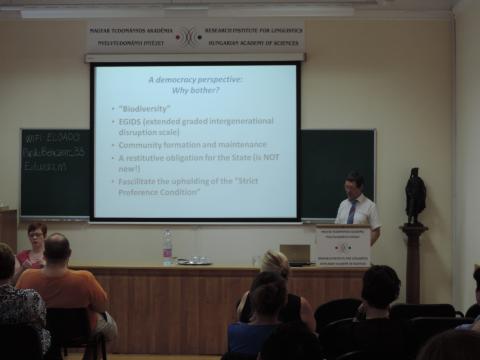Workshop on minority languages and digitalisation

Thomas Moring, professor of communication and journalism at University of Helsinki, held a workshop on the effects of digitalisation on minority languages on 8th July 2014. Thomas Moring was member of the professional committee of the European Charter for Regional or Minority Languages, as well as he carried out comparative researches in the fields of minorities and media, election campaigns, political communication and television/radio broadcast.
The professor highlighted that the Charter is primarily supporting traditional media, and prosumption, the new type of media usage based on the duality of production and consumption is less promoted. Thomas Moring presented the situation of the Swedish minority in Finland and the situation of Scottish Gaelic speakers as examples and showed the characteristic proportion of appearance of each language on, inter alia, the social media sites. Alarming data in terms of minority languages emerged especially concerning the young generation – not only the majority language but also English is becoming overrepresented in sharing information on community sites, therefore, the Swedish as well as the Gaelic languages are being superseded on important communication areas of the young.
In case of sign languages due to their modality only the television is available from among traditional media, however, very few programmes are accessible in sign language in Hungary, subtitling – being useful for many people, however, providing no real aid in several cases – is a good excuse for programme suppliers. Maybe this is the reason for the high popularity of video sharing sites in the Deaf community. Therefore, it is highly important to analyse the sites enabling prosumption from the viewpoint of researches concerning the minority using Hungarian Sign Language.
In the end Thomas Moring and the workshop participants mutually agreed that it would be cardinal to put the theoretical opportunities provided by the Charter into practise efficiently and promoting language use.